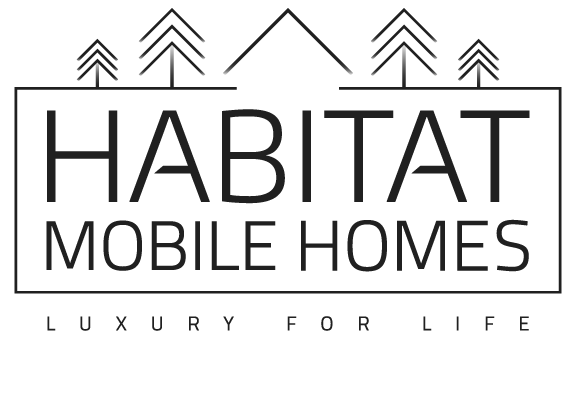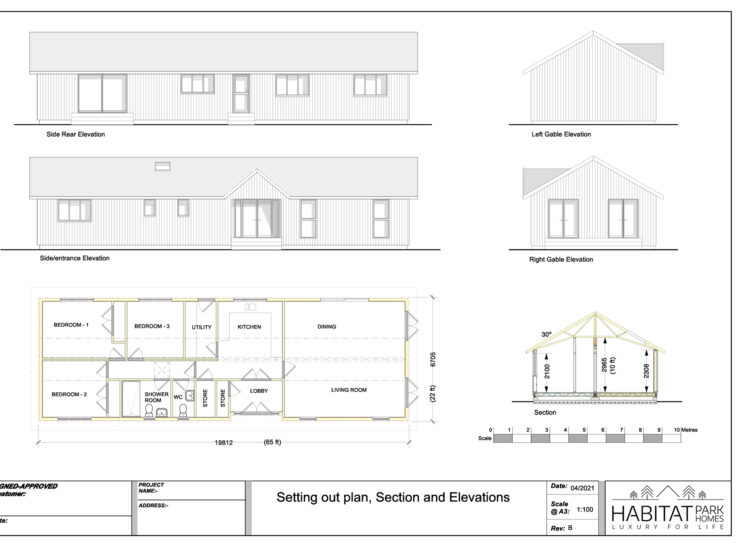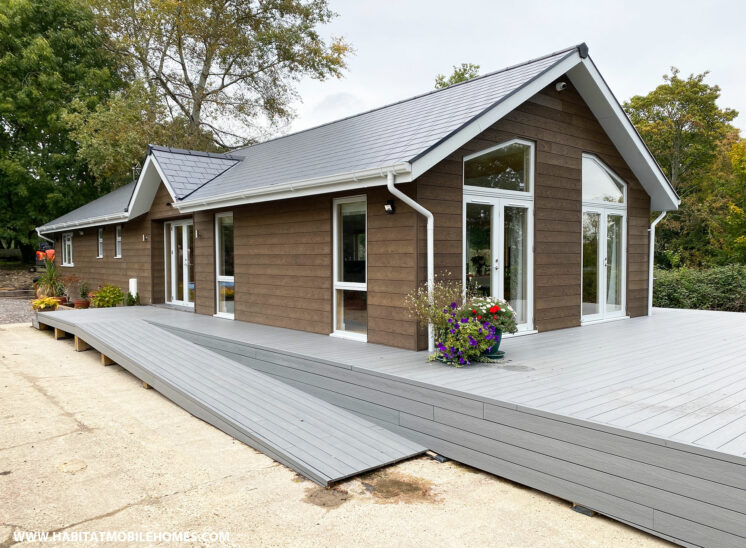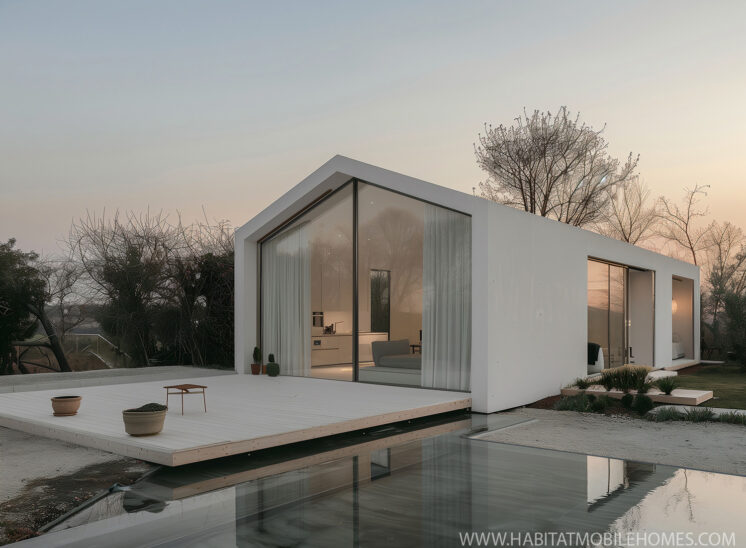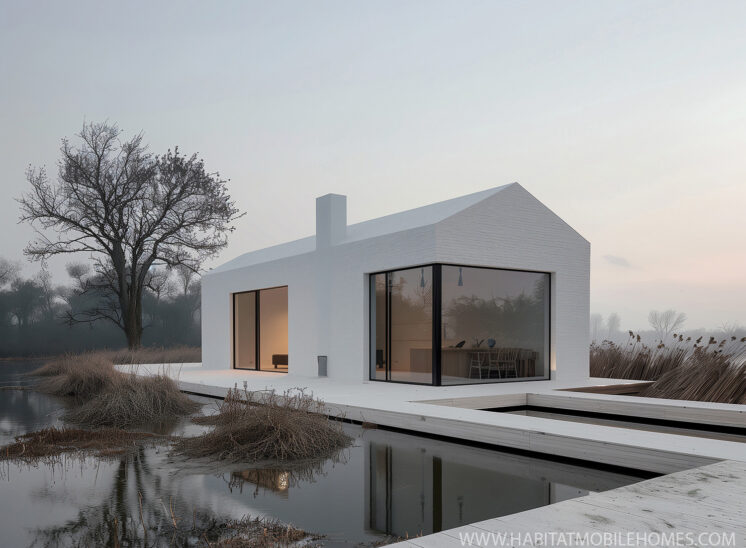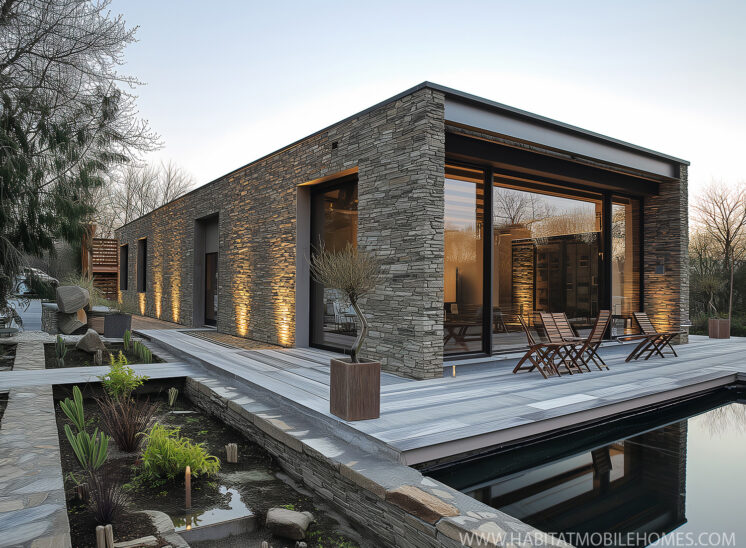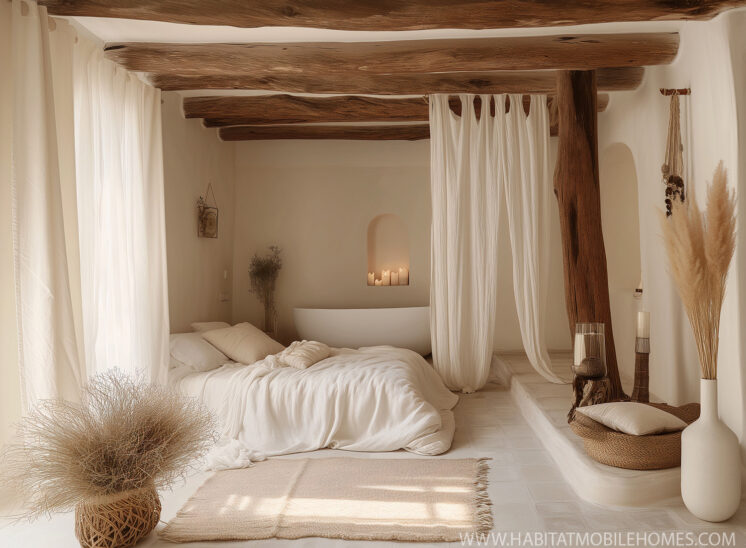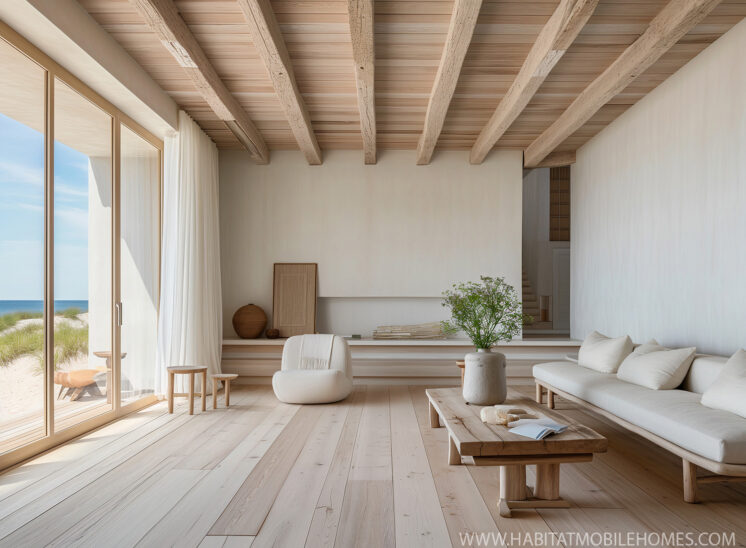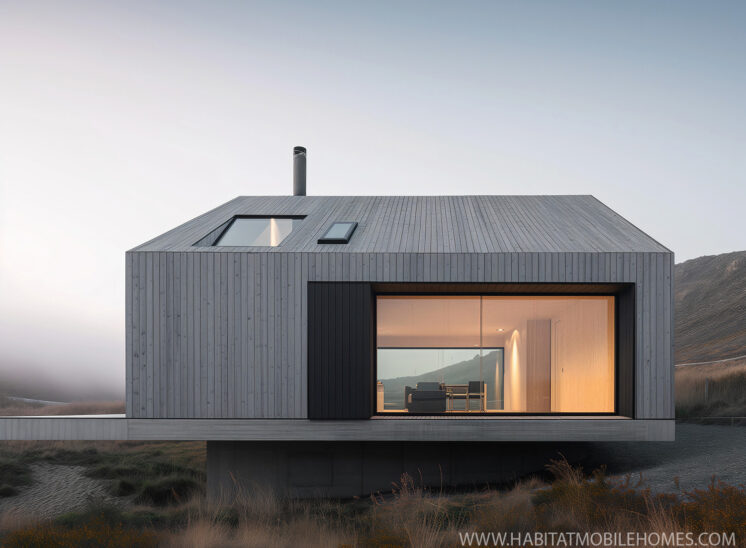Certificate of Lawfulness Applications for Mobile Homes in Gardens
Packages start from as little as £350 for a DIY option. Alternatively, for £750, we can act as your agent and manage the entire application process. We also offer a unique no-win-no-fee service, only for mobile homes in gardens, at £1,500. If you are not awarded a Certificate of Lawfulness, we will refund you in total.
Transform Your Garden into a Dream Living Space with Ease and Confidence
Welcome to Habitat Mobile Homes Ltd., where your vision of adding a luxurious, bespoke mobile home to your garden becomes a seamless reality.
Navigating the path to expanding your living space with a large residential mobile home in your garden can seem daunting. That's where we step in with our groundbreaking no-win-no-fee Certificate of Lawfulness of Proposed Use or Development (CLOPUD) application service, designed to bring clarity, simplicity, and peace of mind to your project.
But what exactly is a CLOPUD, and why is it crucial for your mobile home project?
CLOPUD stands for Certificate of Lawfulness of Proposed Use or Development.
A Certificate of Lawful Development (CLOPUD) is your golden ticket in the realm of property development. It is a legal document issued by your local planning authority that formally recognises your right to place a large residential mobile home in your garden without the need for traditional planning permission. Obtaining a CLOPUD means you're legally cleared to proceed, eliminating any uncertainty and safeguarding your investment from future enforcement action.
Why Choose Habitat Mobile Homes Ltd. for Your Certificate of Lawful Development Application?
- Expertise You Can Trust: With over 15 years of experience in the mobile home industry, we have the knowledge and expertise to navigate the complexities of planning laws, ensuring your application is submitted correctly and efficiently.
- No-Win-No-Fee Peace of Mind: Our unique no-win-no-fee service means you can embark on your project with confidence. We are so confident in our expertise that we only charge if we successfully obtain your CLOPUD, eliminating any financial risk to you.
- Bespoke Designs Tailored to You: Our mobile homes are custom-designed to meet your specific needs and preferences, blending the comfort and aesthetics of conventional homes with the flexibility and advantages of mobile living.
- A Hassle-Free Process: We manage every aspect of your CLOPUD application, from initial consultation to submission and follow-up with local planning authorities. You can focus on the exciting parts of designing your new space, leaving the paperwork to us.
- Add Value to Your Property: A CLOPUD not only legalises your mobile home project but can significantly increase the value and appeal of your property, making it a wise investment for the future.
Ready to Take the Next Step?
Transform your garden into the ultimate space for relaxation, work, or extra living accommodations with Habitat Mobile Homes Ltd. Our team of experts is ready to guide you through the process, ensuring a smooth, hassle-free journey to realising your dream garden home.
| SERVICE | DIY | PAY UPFRONT | NO-WIN-NO-FEE |
| BESPOKE DESIGN AND PLAN DRAWINGS | PREVIOUS PLAN | BESPOKE PLAN | BESPOKE PLAN |
| APPLICATION FORM | INCLUDED | INCLUDED | INCLUDED |
| COVER LETTER | EXCLUDED | INCLUDED | INCLUDED |
| SUPPORTING STATEMENT | INCLUDED | INCLUDED | INCLUDED |
| CONFORMITY REPORT | INCLUDED | INCLUDED | INCLUDED |
| SITE PLAN | EXCLUDED | INCLUDED | INCLUDED |
| COUNCIL FEE (USUALLY £200-275 | EXCLUDED | EXCLUDED | INCLUDED |
| UPLOAD TO PLANNING PORTAL AS AGENT + MONITORING AND RESPONSE STRATEGY | EXCLUDED | INCLUDED | INCLUDED |
| PRICE | £350 | £750 | £1,500 |
- Bespoke Design and Plan Drawings: Detailed bespoke plan drawings of the mobile home, including floor plans and elevations, at a scale of 1:100. These drawings should accurately represent the design, dimensions, and appearance of the proposed mobile home. We also supply a detailed and comprehensive price for the home working to your specified budget.
- Application Form: A completed application form specific to your local planning authority, accurately filled out with all necessary details about your proposal
- Cover Letter: A detailed cover letter that introduces your project, outlining the nature of the proposed use or development and its adherence to legal frameworks. This letter should clearly state that the application is for a CLOPUD and summarise the contents of your application package.
- Supporting Statement: A comprehensive supporting statement or report that addresses the key criteria for CLOPUD applications, referencing relevant laws, policies, and precedents that support the lawfulness of the proposed use or development
- Conformity Report for the Definition of a Caravan: A specialised report establishing that the proposed mobile home meets the legal criteria set forth for caravans, addressing construction, mobility, and dimensional standards as per the Caravan Sites and Control of Development Acts 1960 and associated legislation.
- Site Plan: A detailed site plan at a specified scale (usually 1:500 or 1:200) showing the proposed location of the mobile home within the property. This should clearly demarcate the property boundaries, the main dwelling, and any other significant features of the site
- Fee: The appropriate fee, which varies depending on the local planning authority. This is required for the processing of your application.
- Monitoring and Response Strategy: A systematic plan for checking the application's progress and responding promptly to any queries or updates from the planning authority. This includes preparing to supply additional information or clarifications as required to facilitate a positive evaluation process.
Contact us today to discover how we can help you secure your Certificate of Lawful Development and start bringing your vision to life.
Unveil the Future of Your Garden with Habitat Mobile Homes Ltd: Introducing Our No-Win-No-Fee Certificate of Lawful Development Application Service
In the ever-evolving landscape of home improvement and expansion, Habitat Mobile Homes Ltd stands at the forefront of innovation and customer service. With over 15 years of unmatched expertise in designing and constructing luxury bespoke mobile homes, we are thrilled to introduce a pioneering solution tailored to elevate your property’s potential – our No-Win-No-Fee Certificate of Lawfulness of Proposed Use or Development (CLOPUD) application service for siting a mobile home in your residential garden.
Essential Considerations for Applications. Do you need planning permission to use a mobile home in your garden?
To determine if situating a caravan in your garden is permissible without the need for planning permission, three crucial considerations must be addressed: the caravan's specific location, its adherence to the legal definition, and its functional connection to the main residence.
Location Criteria
The placement must occur within the 'curtilage' of the main dwelling, encompassing areas such as the driveway or garden, but excluding separate lands like adjoining paddocks.
The landmark case of James v Secretary of State for the Environment (1990) established three key factors for identifying if land falls within a building's curtilage:
- Physical Layout: The arrangement and geographic relation of structures on the property.
- Ownership History: Current and past ownership details of the land in question.
- Functional Use: Historical and current uses of the land in relation to the main dwelling.
Caravan Definition Compliance
For a structure to be recognized as a caravan, it must meet the specifications outlined in the Caravan Sites and Control of Development Acts of 1960, along with subsequent regulations. A notable decision by the Secretary of State (Erewash Borough Council, 2002) highlights three tests for this determination:
- Construction Test: Assessing the build and assembly method of the structure.
- Mobility Test: The ability to move the structure from one place to another.
- Size Test: Ensuring the structure falls within predefined dimensional limits.
Usage Guidelines
The caravan's usage must be ancillary to the dwelling, implying it supports and complements the main residence. Grounded in legislative and case law precedents (Hansard, 22 November 2005), four 'incidental' usage criteria have been recognized:
- Occupant Relationship: The connection and interaction between individuals residing in the caravan and the main house.
- Proportional Dimensions: The size comparison of the main house, its garden, and the caravan.
- Accommodation Scale: Evaluating the living space provided by both the caravan and the main house.
- Functional Dependency: The extent to which the caravan depends on the main house for essential services and facilities, underscoring its subordinate role.
